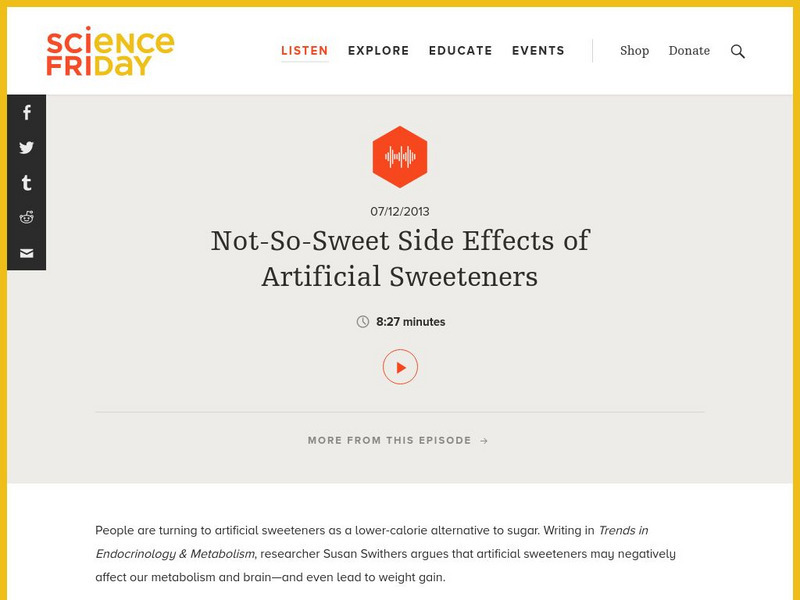SciShow
The WHO Says Diet Soda Causes Cancer. Does It?
The World Health organization recently added aspartame, an artificial sweetener used in diet soda and tea, to its list of possibly carcinogenic substances. But will diet soda really give you cancer? We look at the science behind the...
SciShow
7 Scientific Discoveries Made by... Licking Stuff?
Can scientists actually make discoveries by licking things? Believe it or not, they can. Join Hank Green and learn the surprising amount of discoveries made by scientists....and their tongues.
SciShow
7 Discoveries Scientists Made by Licking Things
You probably know not to lick something unfamiliar. But there are actually a surprising number of discoveries that have been made because scientists licked things. Chapters CONSTANTINE FAHLBERG 0:59 1-3 ARTIFICIAL SWEETENERS 3:03 SALT &...
SciShow
The Science of Sweetness
Sugar, honey, listen up. Humans love the sweet taste of sweetness, but have you ever wondered why? What's the evolutionary purpose behind our love for sweets? Why can we taste sweet anyway? What are those sugar substitutes really made...
SciShow
Are Artificial Sweeteners Bad For You?
While scientists have debunked the notion that putting artificial sweeteners in your coffee will give you cancer, that doesn’t necessarily mean you should go hog wild with them.
Healthcare Triage
The Latest on Artificial Sweeteners and Health
Are there harms of artificial sweeteners that outweigh the benefits? We’ve asked this question before at Healthcare Triage, and the answer was no! There are lots of data that suggest artificial sweeteners are bad, but none of those data...
Healthcare Triage
Do Processed Foods Lead to Depression?
Healthcare Triage is no stranger to dissecting studies about processed foods, but we were recently alerted to a study linking them to depression, and since we haven’t dissected that yet, that’s the topic of this week’s Healthcare Triage.
Institute of Human Anatomy
What Energy Drinks Do to the Body
In this video, Justin from the Institute of Human Anatomy discusses the effects energy drinks have on the body, and specifically the nervous system.
Curated Video
Choosing a Healthy Beverage
Food Detective Berry Blue explains that we research healthy beverages the same way we look for healthy foods – by reading the product labels. Using three fictitious drinks, the food detective helps identify unhealthy ingredients on the...
JJ Medicine
Fibromyalgia & Diet | Mediterranean vs. Vegan vs. Hypocaloric vs. Low FODMAP vs. Gluten-Free Diets
Fibromyalgia & Diet | Mediterranean vs. Vegan vs. Hypocaloric vs. Low FODMAP vs. Gluten-Free Diets & PROBIOTICS - Possible Treatments? Fibromyalgia is the most common chronic, diffuse musculoskeletal pain syndrome that involves...
Healthcare Triage
Are Artificial Sweeteners Harmful?
Our episode on Organic food was a hit, but lots of you had questions in the comments asking about the safety of artificial sweeteners. We live to serve, so this week's episode is about the research in that area. These chemicals get a bad...
Next Animation Studio
Artificial sweeteners may be toxic to digestive gut microbes
New studies find that artificial sweeteners may be toxic to gut microbiome.
Healthcare Triage
Weight Gain, Low-Calorie Sweeteners, and Responsible Translation of Research
A press release on a recently published scientific study has been catching clicks with the headline “low-calorie sweeteners do not mean low risk for infants, new research shows the impact ‘diet’ ingredients have on body weight and gut...
Catalyst University
Biological Fate of Artificial Sweeteners | Erythritol & Sorbitol
Did you ever wonder what happens to artificial sweeteners when you consume them in food? In this video, we track the fates of two of them (erythritol and sorbitol). They cause loose stool, but they can have other functions as well.
Healthcare Triage
Clickbait Headlines and Medical Research! Watch This Video to Keep Your Family Safe!
Aaron is part of a weekly gaming group. Most of the time it's role playing games, although board games come into play as well. Most of the participants are doctors. We have a group text that we officially use to schedule, but...
The Viral Fever
The Bittersweet Truth About Sugar
Sugar: this white wonder that gives us sweet satisfaction... but at a bitter price. What dangers are lurking in these snow white crystals? Is sugar the new tobacco? Can it really lead to other problems like diabetes? Let's investigate...
Healthcare Triage
Honey, High Fructose Corn Syrup, and the Problems with Nutrition Research
Just a few weeks ago, a study was published in the Journal of Nutrition that many reports in the news media said proved that honey was no better than sucrose as a sweetener, and that high-fructose corn syrup was no worse.
JJ Medicine
Absorption and Metabolism of Sugar Substitutes (Artificial Sweeteners) | Aspartame, Sucralose, Etc.
Lesson on absorption and metabolism of sugar substitutes (artificial sweeteners) including aspartame, stevia, sucralose and sugar alcohols. Artificial sweeteners are compounds that simulate the sweetness of sucrose but are used in...
Science Friday Initiative
Science Friday: Not So Sweet Side Effects of Artificial Sweeteners
Artificial sweeteners may negatively affect how the body metabolizes sweet foods.

